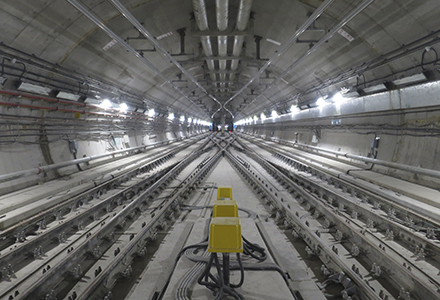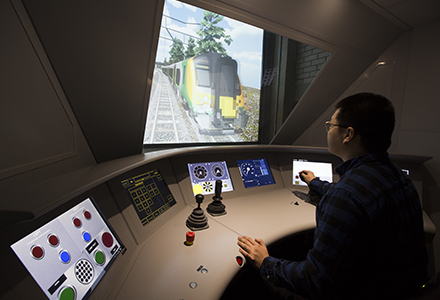






The Centre of Excellence in Digital Systems (CEDS) is led by the University of Birmingham – Birmingham Centre for Rail Research and Education (BCRRE), in partnership with Lancaster University, Imperial College London, Swansea University, University of Hull, University of Derby and University of Surrey.
Together they unite existing academic and industry capabilities, innovating and supporting transformational change in rail technology across the globe. The CEDS builds on the expertise of the Birmingham Centre for Railway Research and Education (BCRRE), the partner universities and the UK’s industrial base to deliver a step change in rail systems capability, securing a world-leading position in the sector and delivering jobs, growth and inward investment nationally and internationally.
To learn more keep reading below.
The Centre focuses on all aspects of digital railway innovation, providing a system-wide approach to transforming research, development and innovation. Technical transformations have a part to play in the delivery of a more cost-effective, customer and carbon-friendly railway that delivers more capacity safely. The development of the CEDS in these areas allows the rail
industry to ‘get there sooner’, thus improving the industry’s bottom line and reputation, as well as supporting the UK’s export agenda.
Initial areas of technological focus will include:
All of these technical transformations have a part to play in the delivery of a more cost-effective, customer and carbon-friendly railway that delivers more capacity safely. The development of the centre of excellence in these areas will help the rail industry to ‘get there sooner’, thus improving the industry’s bottom line and reputation, as well as supporting the UK’s export agenda in the post-Brexit world.
The exact form and function of the Centre will be shaped by the industry partners. Engagement with industry to date has highlighted particular needs and at least four types of activity or space within the Centre are currently anticipated:


The Centre will house openly available facilities and also have the ability to host bespoke research for specific sponsors that enable the railway and its interactions to be accurately represented. Connected models, simulators, assets and humans ‘in the loop’ will enable system, sub system and component levels to be developed, integrated and optimised for performance, capacity, resilience, sustainability, usability (customer satisfaction) and cost. This includes optimisation of existing network and asset base management. It also comprises the technical and business evaluation of introducing technology change, and the staging plans to enable it to be implemented seamlessly.
Industry collaborators will be able to develop and integrate transformational new technologies much more quickly. There will be a greater level of assurance to reduce the costs and risks of the change, and to ensure the greatest improvement impact.
The Centre presents an opportunity for:
The CEDS seeks to translate findings into tangible improvements and impacts on railways. Using an integrated system approach, we seek to provide solutions to the railway’s grand challenges at component level and sub-system level. BCRRE has an international reputation for developing advanced railway traffic management systems to make better use of existing rolling stock and infrastructure, and to manage disruptions. Our work in this area is helping to define the next generation of railway traffic management and control systems.
CEDS member Lancaster University brings world-leading expertise in the fields of networking, Internet of Things (IoT), data science and cyber security. It is the only NCSC accredited centre of excellence in cyber security research in the North West of England and much of this activity looks at areas of national critical infrastructure with a human-centric approach. Through its interdisciplinary work the team has led and collaborated on research related to the rail sector resulting in applied activities around maintenance, drainage, treefall and platform passenger behaviours.

BCRRE has an international reputation for developing advanced railway traffic management systems to make better use of existing rolling stock and infrastructure, and to manage disruptions. Its work in this area is helping to define the next generation of railway traffic management and control systems; the CEDS enhances this capability and accelerates its deployment.
Our capabilities include:

BCRRE’s condition monitoring work focuses on developing and configuring instrumentation and processing systems that can be used to measure, track and predict the health of various railway subsystems. Such systems improve the operational reliability of the railway, or support business cases for variations in existing maintenance procedures. The group operates over a number of Technology Readiness Levels, from producing systems to support fundamental understanding of a railway subsystem, up to working with companies to develop research into commercial products or applications. The group has worked with major organisations within train operating companies and infrastructure. It has received prestigious awards for engineering innovation at a national level for work using in-service instrumentation to target maintenance on a third rail network. Algorithms developed at Birmingham are also used within Network Rail’s Intelligent Infrastructure programme,
which continuously monitors the health of over 5,000 sets of points.

BCRRE investigates fundamental questions about the use of electronic information in the transport domain, from the collection and structured storage of raw data, though efficient processing and algorithms, to the delivery of the appropriate information to staff in a timely manner. Current projects include work on large database design; open data; data exchange and modelling; cyber security; and asset management.

Security Lancaster is one of the largest interdisciplinary security research centres in the UK with a focus on socio-technical systems research allowing it to take a broader view of where the cyber security challenges are and where the solutions may be found. We live in a world in which our ability to capture personal user data far exceeds our understanding of how to manage issues of trust, privacy and consent with potentially far-reaching consequences for both individuals and society.
It is home to the Cyber Security Research Centre, one of the first Academic Centres of Excellence in Cyber Security Research (ACEs-CSR), a national hub for maximising behavioural and social science research into understanding, countering and mitigating security threats.

The research of the CSRC is focused around four themes: Security of Large-Scale Networks, Security of Cyber Physical Systems and Infrastructures, New forms of Privacy and Identity, and Cyber Security Behaviours. Recognised by the Engineering and Physical Sciences Research Council (EPSRC) and the National Cyber Security Centre (NCSC), along with CREST (Centre for Research and Evidence on Security Threats), it is a well-established multidisciplinary community, it naturally approaches cyber security problems in a disruptive and innovative way. It is a rich, vibrant community of multidisciplinary researchers passionate about driving the development of solutions to the challenges of modern digital life. The unique blend of interdisciplinary, systems-centred and resilience-focused research on cyber security has led to a range of innovative research programmes – establishing Lancaster as a leading international centre in cyber security research.
Both Security Lancaster and the Cyber Security Research Centre follow the ethos ‘build what we study, and study what we build’. Building on the three foundational elements of – Multidisciplinary Approach, Socio-Technical Systems Research & Real-World Applicability – that enables it to undertake disruptive, innovative research with internationally recognised, socioeconomic impact.

As part of their NCSC Accredited Centre of Excellence in Cyber Security Research Lancaster University have their Industrial Control Systems Lab. The ICS Lab is a practical, reconfigurable research space hosting real equipment found in common process control environments. But it is not just the Operational Technology present, the Lab is-able to emulate a corporate IT infrastructure as well. This enables security research on a range of live systems to explore all forms of cyber security challenges.

IsoLab has been designed to provide the most advanced environments for studying quantum systems in controlled conditions at Lancaster University. It houses a suite of three laboratories where vibration, noise and electromagnetic disturbance have been drastically reduced, creating an “ultra-clean” environment for measurement and characterisation.

Hosted at Lancaster University the Cyber Threat Laboratory is designed to provide a collaborative platform that allows analysis of threats and behaviour to take place, in a safe and controlled environment. The laboratory provides centralised infrastructure enabling multiple projects and experiments operating simultaneously inside the lab to benefit from mature industry standard tools. Comparable to any research with unknown volatile outcomes, experiments into cyber threats and malware also needs to be handled in a controlled environment with appropriate safeguards and equipment.

The LIRA Research Centre was set up in early 2018 with the aim to bring together the diverse research excellence and expertise in the areas of Intelligent, Robotic and Autonomous Systems (IRAS). Its core is formed by 30 academics from a range of departments all interested similar application domains, including rail. Exploring the impacts of privacy, trust and security issues regarding the use of the IoT to personalise public spaces such as train stations.